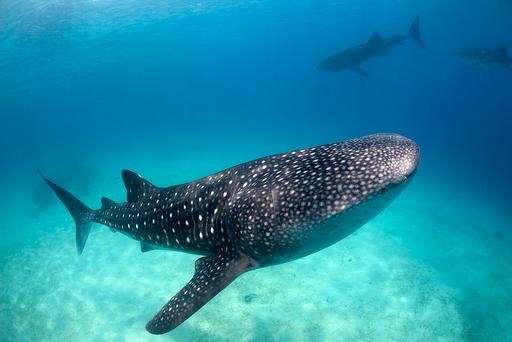Protecting nature starts with science. Here’s a roundup of recent research published by Conservation International experts.
1. Cargo ships are threatening the world’s largest fish
Whale sharks are the largest fish in the sea, longer than a school bus and weighing up to 19,000 kg (42,000 pounds).
However, a recent study found that these endangered gentle giants are facing a formidable foe: shipping vessels.
Using satellite-linked tags, a group of the world’s leading whale shark researchers — including Conservation International scientist Mark Erdmann — monitored the movements of 348 whale sharks throughout the ocean. Then, they combined this information with a global database that tracks the routes of shipping vessels, which can strike and kill whale sharks traveling along the same path.
They found that busy shipping lanes cut through more than 90 percent of the known range of whale sharks.
“These results are staggering — and unsettling,” Erdmann said. “One of the types of satellite tags attached to the whale sharks is designed to pop off if the fish remains at a constant ocean depth for a long period of time, which likely signals that the animal is dead. Through this tagging data, we could literally see the moment a whale shark was likely struck by a boat and watch it slowly sink to the seafloor hundreds of meters below.”
In the past few decades, whale shark populations have been halved due to overfishing, vessel strikes and bycatch — when unwanted fish are caught in nets unintentionally.
The good news is that relatively simple changes can protect this massive fish from vessel strikes.
“Whale sharks are highly migratory and tagging data has helped us determine what seasons they migrate and the routes they take,” Erdmann said. “Reducing ships’ speed limits or temporarily changing shipping routes while whale sharks are migrating could significantly reduce collisions — and save whale shark populations worldwide.”
2. How do we prevent the next pandemic? Stop it at the source
Most emerging infectious diseases originate in animals, particularly wildlife, and then “spill over” into people.
Public health experts, scientists, and conservationists recently came together to publish an essay in the journal Nature highlighting the leading causes of pathogen spillover and calling on global policymakers to take urgent, targeted action to prevent future pandemics.
They recommended four pandemic prevention strategies: protecting tropical and subtropical forests; strictly regulating the global wildlife trade; improving practices around raising farmed animals; and promoting health and economic security for people living in emerging disease hotspots.
“Spillover has likely caused every viral pandemic over the last century and its potential to trigger new pandemics is only growing,” said practicing physician Dr. Neil Vora, the essay’s lead author and the pandemic prevention fellow at Conservation International. “We are urgently asking the world’s policymakers to grow investments in preventing pandemics at the source.”
Despite studies revealing that many pandemics are fueled by the destruction of nature — including seminal research by Conservation International published in 2020 — governments have not taken sufficient action to mitigate future pandemics by protecting high-risk ecosystems now, according to the essay’s authors.
FURTHER READING:
Given current efforts to reform the global architecture to address pandemics and to conserve biodiversity, the political landscape is ripe to address the disconnect, Vora said.
“The time to act is now, and fortunately there are several negotiations — such as for a pandemic agreement through the governing body of the World Health Organization — taking place right now to discuss pandemic prevention on a global platform,” he said. “Failure to implement actions to prevent pandemics will leave the world in a perilous position — one where the next pandemic remains on the horizon.”
3. Conserving nature could help confront humanity’s most pressing issues
From ending poverty and hunger to ensuring access to affordable energy, the United Nations’ Sustainable Development Goals are an ambitious global “to-do” list accompanied by 169 specific targets for action. Researchers from Conservation International have now found that half of those targets depend on nature for their achievement — yet for two-thirds of those, nature’s role goes unstated and therefore risks being underutilized or ignored.
“The current language in the SDGs is blind to the many ways in which nature supports human health and wealth,” said Conservation International scientist David Hole, the study’s lead author. “To maintain the services that nature provides for us, we must protect ecosystems worldwide — and making it crystal clear how they can help achieve global goals like the SDGs will help do that.”
Currently, only two of the seventeen goals directly focus on the sustainable use of marine and terrestrial resources. With the deadline to achieve the SDGs rapidly approaching in 2030, scientists say it’s critical for the international community to recognize the importance of nature in fulfilling global goals to address sustainable development needs — from food and water security to affordable energy.
Later in 2022, world leaders will meet in Montreal to negotiate new goals to protect Earth’s biodiversity under the Convention on Biological Diversity at the Conference of Parties (CBD COP 15). According to the study’s authors, this meeting will offer an opportunity to fill many of the nature-focused gaps left by the SDGs in supporting human well-being.
"Nature is an incredible ally for humanity, having long protected us from climate catastrophe. And now we're running out of time to sustain it," said Lina Barrera, vice president of international policy at Conservation International and co-author of the study. "Studies like this show the value of conserving nature in areas where communities rely on it and help us to better advocate for nature-positive policies around the world."
Kiley Price is the staff writer and news editor at Conservation International. Want to read more stories like this? Sign up for email updates here. Donate to Conservation International here.
Cover image: Whale shark in the Philippines© Klaus Stiefel)
